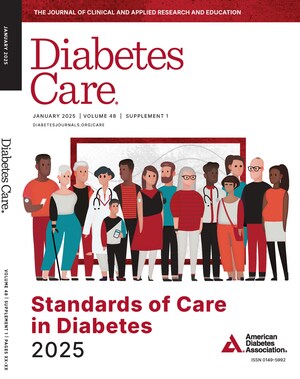CHICAGO, June 14, 2020 /PRNewswire/ -- Research presented today at the American Diabetes Association's® (ADA's) 80th Virtual Scientific Sessions shows the Affordable Care Act's Medicaid Expansion appears to have substantial positive effects on the care of racial and ethnic minorities with diabetic foot ulcerations (DFUs). A study entitled "The Affordable Care Act Medicaid Expansion Correlated with Reduction in Lower Extremity Amputation among Minorities with Diabetic Foot Ulcerations," found a 17% decrease in the risks of amputation among patients who resided in states that adopted Medicaid Expansion in 2014.
Existing research shows more than half of people with a diabetes-related lower extremity amputation will die within five years—a rate higher than most cancer-related deaths. It is estimated up to one-third of people with diabetes will develop a foot ulcer—the most common reason for foot infection and leg amputation. Loss of sensation in the feet (peripheral neuropathy) and blockage in the artery (peripheral artery disease) are major risk factors for leg amputation. Racial and ethnic minorities have significantly higher risks of DFUs and leg amputation than non-Hispanic Whites. Lack of health insurance is known to be a significant factor in patients with diabetes and peripheral artery disease.
In 2010 Congress passed the Patient Protection and Affordable Care Act (ACA) with the aim of reducing the number of uninsured Americans, but whether to expand Medicaid coverage was a decision lawmakers left to individual states. Researchers analyzed 19 state inpatient databases from 2013 to 2015 to identify people with DFUs who were either uninsured or who had Medicaid coverage. Patients were then categorized into early-adopter states and non-adopter states. The study included 25,493 non-white Medicaid beneficiaries and 9,863 uninsured minority patients, aged 20 to 64, all of whom had DFUs.
The data analysis revealed:
- In early-adopter states, the number of inpatient admissions to treat DFU for Medicaid beneficiaries increased by 180.7%, while the number of admissions for uninsured patients decreased by 21.5%.
- In non-adopter states, the number of admissions of uninsured patients increased by 78.2%
- The odds of major amputation among non-white Medicaid beneficiaries decreased by 17.3% in early-adopter states and increased 1% in non-adopter states.
- The odds of minor amputation increased 14% in early adopter states and decreased 8% in non-adopter states.
"These results might suggest patients with DFUs living in states that chose to expand Medicaid coverage might be seeking care earlier and were able to prevent major leg amputation," said Tze-Woei Tan, MBBS, MPH, FACS, assistant professor of surgery at the University of Arizona, core member at the Southwestern Academic Limb Salvage Alliance (SALSA), and lead author of the study. "African Americans, Hispanics and those without health insurance have disproportionately higher risks of lower extremity amputation, so access to care for patients with foot ulcers is vital. The broadening of the ACA may reduce disparities in diabetes-related amputations."
Research presentation details:
- Dr. Tan presented the research during the session below.
- Session Title: Limb Salvage—Cell Therapy to Care-Delivery Systems (With Roger Pecoraro Award Lecture and ADA Presidents' Select Abstract Presentation)
- Date: Sunday, June 14, 5:00 – 7:00 p.m. CT (all sessions will be recorded and available for viewing for up to 90 days)
- Abstract Number 217-OR
For more information or to schedule an interview with Dr. Tan, please contact Daisy Diaz by phone at (703) 253-4807 or by email at [email protected].
About the ADA's Scientific Sessions
The ADA's 80th Scientific Sessions, the world's largest scientific meeting focused on diabetes research, prevention and care, will be held virtually June 12-16, 2020. Leading physicians, scientists and health care professionals from around the world will unveil cutting-edge research, treatment recommendations and advances toward a cure for diabetes. Though the conference will be remote this year, attendees will receive exclusive access to nearly 2,000 original research presentations and take part in provocative and engaging exchanges with leading diabetes experts. Learn more and register at scientificsessions.diabetes.org and join the Scientific Sessions conversation on social media using #ADA2020 and #ADAGoesVirtual.
About the American Diabetes Association
Every day more than 4,000 people are newly diagnosed with diabetes in America. More than 122 million Americans have diabetes or prediabetes and are striving to manage their lives while living with the disease. The American Diabetes Association (ADA) is the nation's leading voluntary health organization fighting to bend the curve on the diabetes epidemic and help people living with diabetes thrive. For nearly 80 years the ADA has been driving discovery and research to treat, manage and prevent diabetes, while working relentlessly for a cure. We help people with diabetes thrive by fighting for their rights and developing programs, advocacy and education designed to improve their quality of life. Diabetes has brought us together. What we do next will make us Connected for Life. To learn more or to get involved, visit us at diabetes.org or call 1-800-DIABETES (1-800-342-2383). Join the fight with us on Facebook (American Diabetes Association), Twitter (@AmDiabetesAssn) and Instagram (@AmDiabetesAssn).
Contact: Daisy Diaz
703-253-4807
[email protected]
SOURCE American Diabetes Association

Related Links
WANT YOUR COMPANY'S NEWS FEATURED ON PRNEWSWIRE.COM?
Newsrooms &
Influencers
Digital Media
Outlets
Journalists
Opted In






Share this article